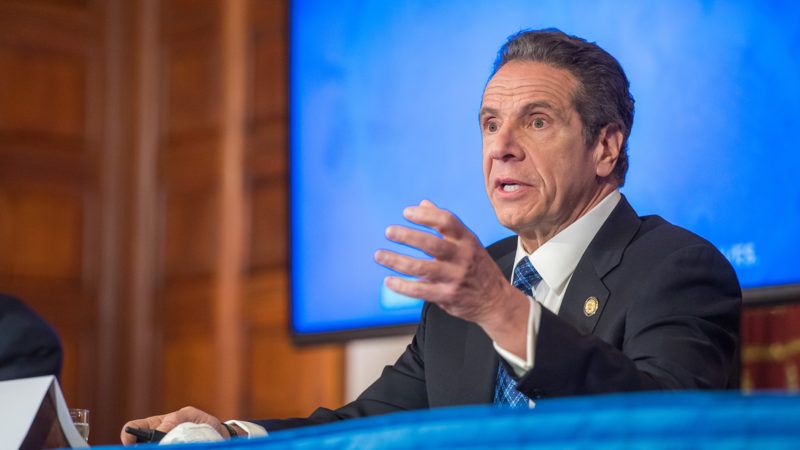'Why Is a Liquor Store Essential and I'm Not?' Asks Store Owner During N.Y.C. Coronavirus Lockdown
It's time to push back on arbitrary classifications that punish businesses and customers alike without clearly helping public health.

"Why is a liquor store essential and I'm not?"
That's the question the owner of a men's clothing store in New York City is asking. It's a good one. It calls attention to the largely arbitrary way that state and local officials classified businesses while shutting down the economy a few weeks ago, consigning record numbers of workers to unemployment and shops to bankruptcy with the stroke of a pen.
The business owner who asked the question above is in significant ways unsympathetic. Eliot Rabin runs an upscale boutique called Peter Elliot, where a polka dot tie costs $200 and a pocket square can set you back $85. I've spent less than $85 for a suit, which at Peter Elliot can set you back as much as $15,000, according to the New York Post. You might assume that someone who sells clothing that fetches such prices will be able to weather this storm. But of course it's not just him, or even his presumably silk-stockinged customers. Rabin, a 78-year-old Army vet, tells the Post "he had to cut 12 members of his 21-person staff, some of whom have been with him for 35 years….I'm fighting for the soul of my company and my people."
Under the lockdown rules in place in New York (city and state), Peter Elliot isn't considered an "essential business" and thus can't legally open its doors (go here for a list). If it offered laundry or dry-cleaning services, it might be allowed to sell clothes on the side, and it's true that Rabin can apply to have his store reclassified as "an essential business for the purposes of Executive Order 202.6."
But why should he have to, especially if he is enforcing social distancing and regularly disinfecting surfaces throughout his shop, which he opened illegally over the weekend? The Kmart in my downtown Manhattan neighborhood is open because it sells groceries and has a pharmacy, thus qualifying as an essential business. But shoppers are also free to wander the entire store, including its clothing, toy, furniture, and bedding sections. Why shouldn't stores dedicated to selling those same items be allowed to open if they want to, assuming they abide by agreed-upon public health measures? Many stores would choose not to open and demand would surely be slight, which are arguments in favor of decentralizing the decision down to individual businesses and customers. We're not talking huge numbers, but a store eking out some subsistence-level revenue while serving a trickle of customer is a good thing that is unlikely to have a major impact on COVID-19 numbers.
USA Today is warning of "quarantine fatique" as warm weather approaches and deaths and hospitalizations across America are declining and flattening, largely due to lockdowns designed to buy us time to adjust. Government officials and folks in the legacy media are quick to arrest and mock people who are chafing under the lockdowns (or, in the case of new-media outlet, Vox, accuse protesters of racism). As health-care analyst and president of the Foundation for Research on Equal Opportunity Avik Roy told me in a discussion of his group's plan to reopen the economy, if you can work from home and your livelihood isn't especially threatened by the lockdown, you're unlikely to have a strong sense of urgency about the current situation. Sure, the lockdown is inconvenient, but it's not an existential threat to your lifestyle.
But only about one-third of us can realistically work full-time from home and just a few weeks into all this, unemployment is already around 20 percent, the worst number seen since the 1930s. People aren't going stir crazy simply because they can't eat at Michelin-starred restaurants or attend Broadway shows. They're terrified that their jobs and simple pleasures are gone for good.
Pushing to allow owners, employees, and customers—all of us, in short—to get back to something approaching normalcy isn't some infantile or childish gesture. As with reopening colleges and universities, it can be done in a way that minimizes health risks for all involved while bringing more and more of our regular lives back online. Characters such as Eliot Rabin—who avers, "If I do get in trouble, it will be for the right reasons"—are reminders that the same governments that were so unprepared for this pandemic deserve to be questioned and challenged even or especially as they assert more control over more parts of our lives.


Show Comments (110)